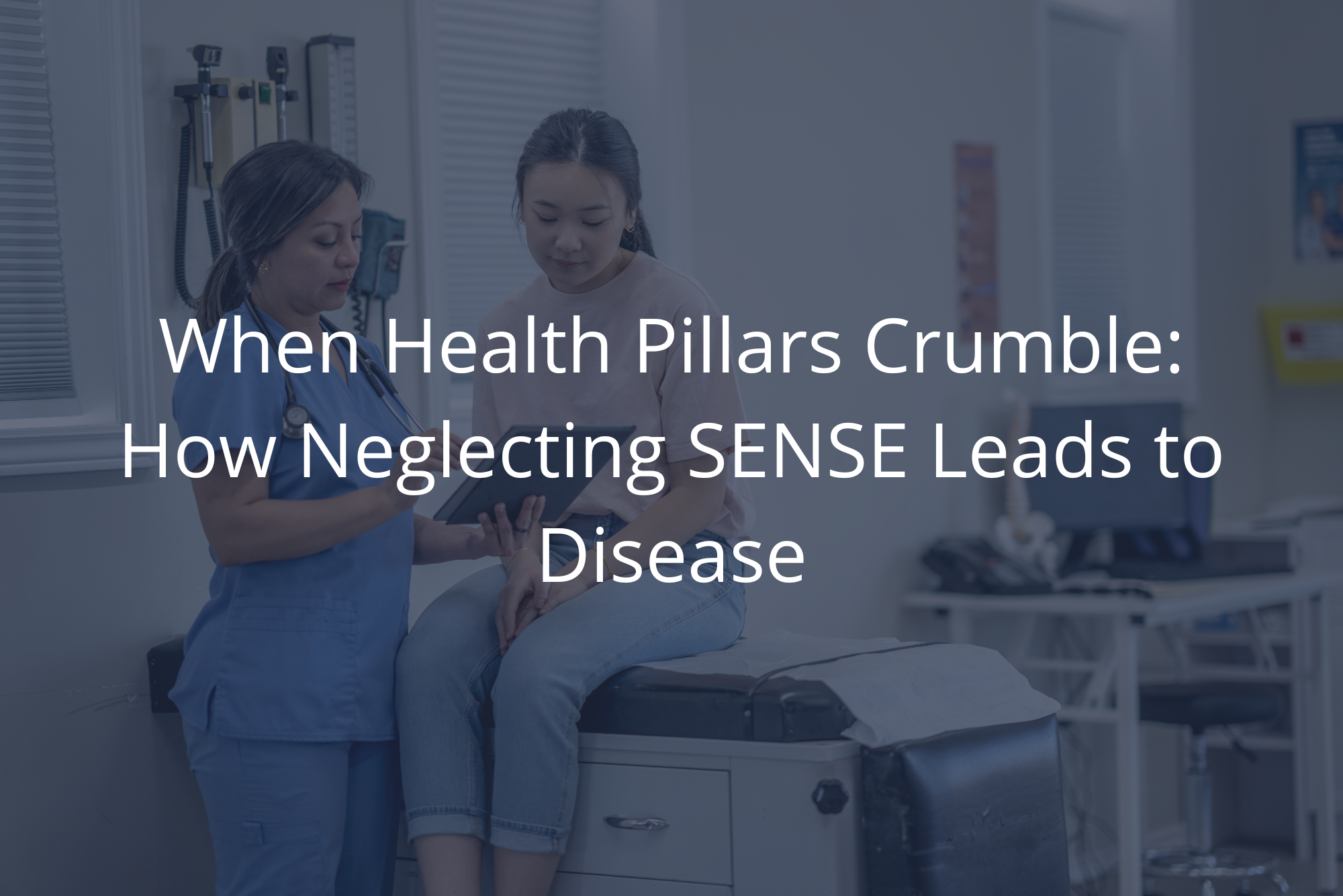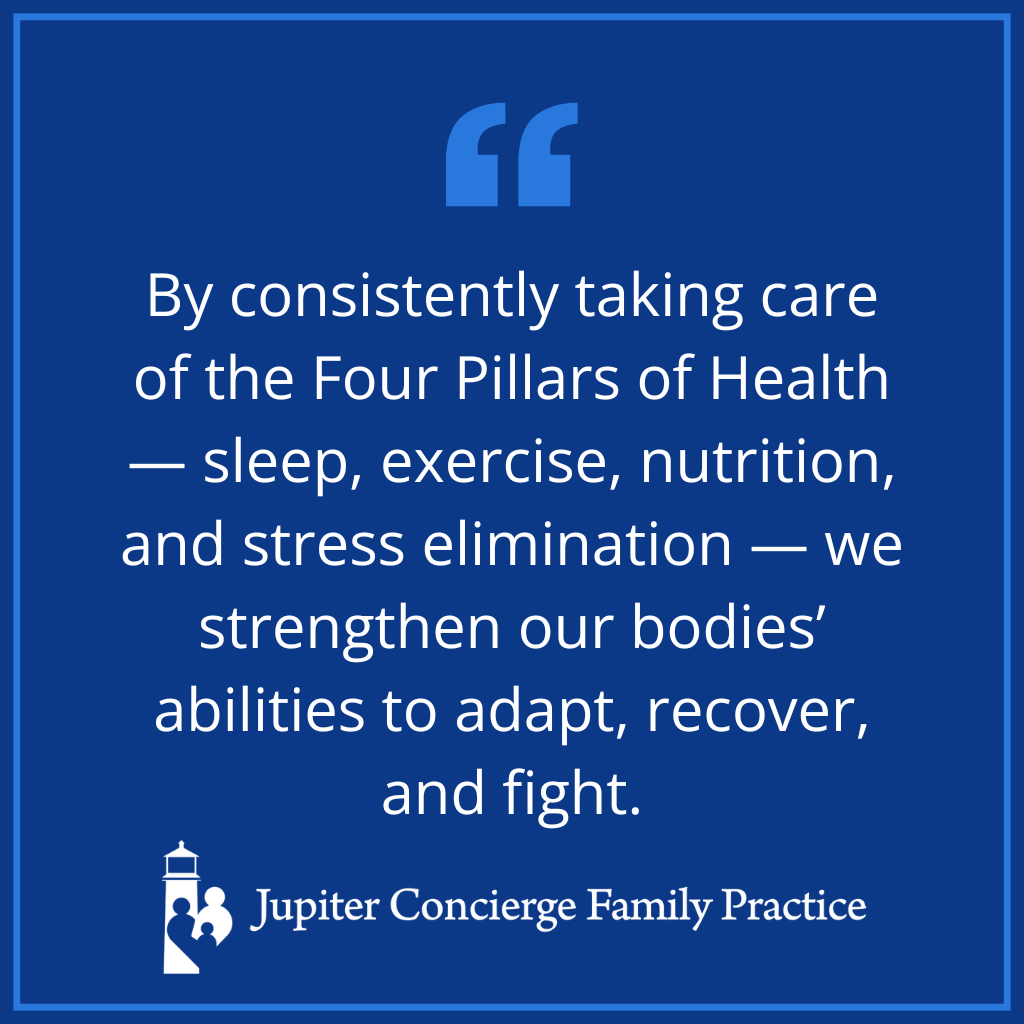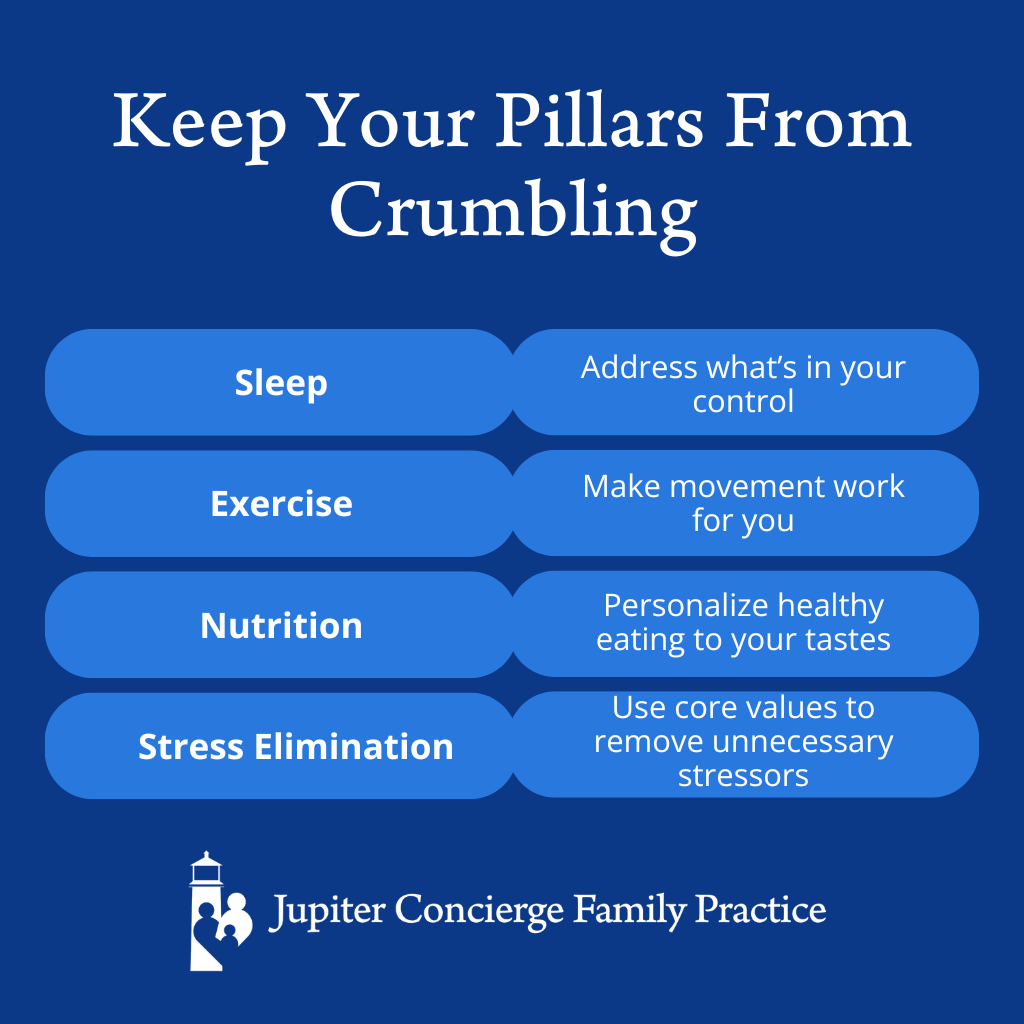
I love to speak about the acronym SENSE, which stands for sleep, exercise, nutrition, and stress elimination. These Four Pillars of Health form the basis for a strong and enduring foundation of wellness in every human life.
Of course, the converse is also true. Deficits in any or all of these mainstays produce a greater susceptibility to disease and an increased likelihood of requiring medical intervention.
To illustrate, let’s look at how each pillar supports health and examine the potential repercussions when one loses its strength.
Losing SENSE: What Happens When Pillars Crumble
While many of us determine to give adequate attention to each pillar of health, the full schedules and high expectations of modern life gradually erode our good intentions.
Since human nature often benefits from both the carrot and the stick, discussing the specific consequences of weakness in each pillar may prove helpful (along with some tips and tricks for success).
Sleep: It’s Not for When You’re Dead
Sleep is the unsung hero of health. We need adequate sleep each night to reboot our mental hard drives, regenerate our bones, enhance our immune systems, and repair our cells, tissues, and muscles after a long day of use.
All this occurs without our knowledge — or even our consciousness — which is both semi-miraculous and potentially problematic. Because we don’t notice its many benefits, sleep tends to be the first pillar to weaken. When our minds tell us we feel fine and our calendars tell us we need more hours in the day, we filch those hours from our slumber.
This short-term “time-saving” measure often sabotages our schedules later. With inadequate time to rest, repair, and rebuild, our physical and mental infrastructure suffers, disturbing our overall health and abilities.
Immediate effects of lost sleep include symptoms like brain fog, lethargy, irritability, and reduced stress tolerance, to name a few. Longer-term effects can be more serious. For example, reduced sleep appears to short-circuit proper metabolic processes, expediting problems like weight gain, insulin resistance, and diabetes.
Poor sleep facilitates other serious conditions as well, including:
- Anxiety
- Depression
- Vascular or Alzheimer’s dementia
- Elevated blood pressure
- High cholesterol
- Osteoporosis
- Heart attack
- Stroke
In short, sleep is far more essential than we may be cognizant of, and putting it on the back burner affects our health in meaningful and significant ways.
Address What’s in Your Control
Not all sleep loss stems from packed schedules or revenge bedtime procrastination. Underlying problems like sleep apnea and hormone imbalances impact sleep duration and quality, and they require medical evaluation and treatment to overcome.
Other issues like anxiety, racing thoughts, and stress frequently interfere with sleep, as do poor sleep hygiene and habits. Whether it’s speaking with a therapist, using an app like Calm, or practicing meditation or self-hypnosis, many resources are now available to help with sleep challenges like these.
Environmental factors can also play a role in sleep loss. Perhaps you live in a noisy, active city, or your window faces a streetlight. Though you can’t always change your external environment, you can get creative in countering its sleep-disrupting factors. For instance, you might address excessive sound with ear plugs, a loud fan, or a white noise machine, or you might hang extra shades or light-blocking curtains over a bright window.
The bottom line is that sleep is crucial enough to health that we need to allot it adequate space and attention. Then, when we identify disruptive elements, we can take the steps necessary to regain our rest.
Exercise: More Than a Beach Body
Exercise is more than just a method for gaining muscle or looking good on vacation. It’s a fundamental pillar that supports nearly every system in the body and all the other pillars of health as well. But when we don’t exercise enough or we exercise incorrectly, the consequences can be profound.
Let’s first talk about incorrect exercise. Many people focus on building muscle tone without considering the full spectrum of physical health, such as flexibility, balance, and cardiovascular fitness. While it may seem like a win to strengthen specific muscles, an imbalanced approach leaves us vulnerable.
Without flexibility, our joints suffer, and tendons and ligaments become more subject to injury. Without cardiovascular exercise, our heart and lungs don’t function optimally. And without balance training, our risk of falls and injuries increases as we age. True, health-promoting fitness involves integrating each of these elements into our routines.
When we allow exercise to slip, we may not realize how much the loss affects our overall health.
A loss in muscle mass, for instance, impacts far more than our appearance. Muscle plays a critical metabolic role in how we break down food for use as energy. One way our bodies store sugar is as glycogen in our muscles, which helps regulate our blood sugar levels. Thus, people who increase their muscle mass are also increasing their glucose control and reducing the likelihood of developing insulin resistance.
Further, a lack of sufficiently vigorous activity leaves us open to cardiovascular problems, such as high blood pressure and heart disease. Poor lung function, increased risk of heart attack, and even cognitive decline due to reduced brain circulation have all shown links to a sedentary lifestyle.
Make Movement Work for You
The good news is that exercise doesn’t have to be complicated or expensive. You don’t need a gym membership or fancy equipment to increase or maintain your health.
Simple activities like walking up and down a flight of stairs, lifting a can of soup as a weight, or using a resistance band at home all deliver meaningful benefits. Maybe working out in the garage allows you the time and privacy you need, or maybe joining a community fitness group provides a motivating sense of camaraderie.
The bottom line is that exercise is a non-negotiable part of a healthy lifestyle, but there’s no one “right” way to go about it. Find what works for you so you can keep this pillar strong for the long term.
Nutrition: Keep It Whole
Nutrition provides the essential building blocks our bodies need to function, heal, and protect against disease. Yet busy lives and poor food education make it easy to fall into habitual shortcuts.
Three common issues undermine the pillar of nutrition in many of our lives. The first: an under-appreciation of the importance of fruits and vegetables.
Produce is a non-negotiable source of the minerals and vitamins that act as cofactors for countless biochemical reactions in our bodies. Without these nutrients, we lack the building blocks for essential processes, such as healing.
Another nutrition issue is the prevalence of processed foods in American diets. We don’t just need enough nutrition; we also need the right nutrition to supply our bodies. Additives, empty calories, and toxins from these foods increase the risk of major health issues like cancer, diabetes, heart disease, and stroke.
Finally, it’s helpful to realize that not all healthy foods are healthy for every person. Certain items may trigger or exacerbate specific health conditions in one person but not another.
For example, irritable bowel syndrome may be triggered by some otherwise healthy foods that a person’s body simply doesn’t tolerate well. In other cases, those with a tendency to develop kidney stones may need to follow a completely different specialized diet.
Personalize Healthy Eating to Your Tastes
Though healthy eating does tend to cost a little more, smart shopping techniques mean it doesn’t have to be expensive. While fresh produce can carry a heftier price tag, for instance, frozen fruits and vegetables typically offer greater nutrition at a lower price.
You can follow a few simple tips for building a nutritious meal plan that supports health and prevents disease:
- Shop the perimeter of the supermarket, avoiding the processed, nutrient-poor foods of the inner aisles.
- Prioritize eating the rainbow, varying the colors (read: nutrients) of your foods throughout the day.
- Opt for frozen produce, which is generally cheaper and holds onto more of its nutrients by being frozen just after harvest.
- Experiment with new, nutrient-rich recipes that appeal to your personal tastes; you need to enjoy what you eat!
The wealth of free resources available online provides endless opportunities to strengthen this pillar of health and make nutrition a practical and enjoyable part of your everyday life.
Stress Elimination: Protect Your Body and Mind
Stress isn’t always bad. In fact, it plays a crucial role in providing motivation, heightening concentration, and helping our bodies function more efficiently. When stress becomes excessive, however, it has the opposite effect.
Rather than assisting us, too much stress wreaks havoc on our bodies, leading to increased inflammation, oxidative damage (essentially, a form of rotting), and even organ dysfunction. Over time, chronic stress can damage muscles, bones, and tendons, paving the way for injury and illness.
Of course, none of us can avoid all stress. When I talk about stress elimination, I’m referring to removing the elements in our lives that cause unnecessary stress. This includes obvious stressors like negative people or overwhelming work situations, as well as less obvious sources like poor food choices.
Regardless of the source, unaddressed stress can lead to a host of physical and mental health problems. Conditions like anxiety and depression develop when stress overwhelms the body’s ability to regulate neurotransmitters. Serious physical conditions like ulcers, high blood pressure, heart attacks, and strokes also receive a significant contribution from stress.
Use Core Values to Remove Unnecessary Stressors
The best way to eliminate stress is to clearly define our priorities and core values. Then, we can identify elements in our lives that are contradictory to those core values and remove them.
Perhaps maintaining a healthy marriage is a core value for you. If you identify this value and notice you’re experiencing difficulties in that relationship, you can then examine what underlying stressors might be contributing to the issue. Is it stress at work? Too much on the family calendar? Something else? Whatever it is, you can remove it to facilitate health in that area of priority.
If work is a significant stressor, you don’t necessarily have to quit your job to reduce or eliminate stress. Instead, you might try delegating tasks that don’t align with your strengths. Focusing on areas in which you excel rather than trying to shore up areas of weakness can significantly reduce unnecessary workplace pressure.
Sometimes, we’re too entrenched in our routines to see unnecessary sources of stress clearly. Friends and loved ones may offer a valuable outside perspective, helping us identify areas in our lives where we can reduce or eliminate stress altogether.
By looking inward and noting what’s causing stress in our lives, we open the door to more joy, better communication, and a stronger body. When we focus on aligning our actions with our core values, we eliminate much of the unnecessary stress that weighs us down.
The Power of SENSE: Strengthen Your Defenses for the Future
We can’t predict every health challenge that may arise; just recall the COVID-19 pandemic or the frequent headlines about microplastics in our diet. What we can do is shore up our defenses and make smart choices about what we can control.
From avoiding plastic water bottles, to cooking with stainless steel instead of Teflon, to minimizing our intake of convenience and processed foods, we have the power to infuse our bodies with strength and resilience.
By consistently taking care of the Four Pillars of Health — sleep, exercise, nutrition, and stress elimination — we strengthen our bodies’ abilities to adapt, recover, and fight. We can’t avoid every toxin or virus that comes our way, but we can equip our bodies to defend themselves in an unpredictable world.


Dr. David Rosenberg
Dr. Rosenberg is a board-certified Family Physician. He received his medical degree from the University of Miami in 1988 and completed his residency in Family Medicine at The Washington Hospital in Washington, Pennsylvania in 1991. After practicing Emergency Medicine at Palm Beach Gardens Medical Center for two years, he started private practice in Jupiter, in 1993. He is an avid baseball fan and Beatles fanatic, since he was 8 years old. He has been married to his wife, Mary, since 1985 and has three grown children.
David completed additional studies at Mercer University, Macon, Georgia and obtained a BS in Chemistry in 1983.
“My interests include tennis, snow skiing, Pilates and self-development.”

